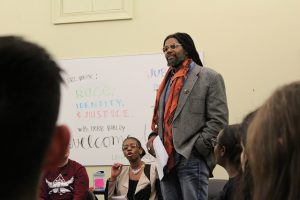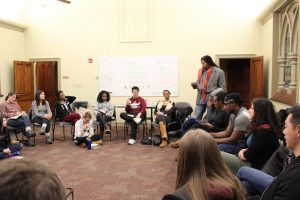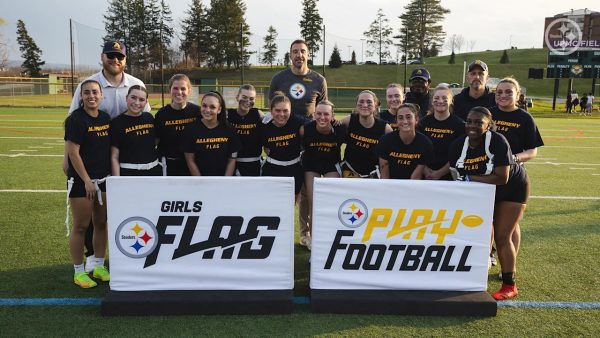Cafe director presents talk in Ford Chapel
Bailey discusses race and identity topics with college students
Herb Bailey, director of the Uncommon Grounds Cafe, presented “Race, Identity and Justice” on Tuesday, Jan. 30, at 8:30 p.m. in Ford Memorial Chapel. Allegheny Christian Outreach hosted the event.
Bailey addressed the fallacy of stereotypical thinking and prompted the audience to ask where those ideas came from while calling attention to misconstrued facts that were believed to be true.
“Jesus was a Middle Eastern Jew, not a blonde-haired, blue-eyed, happy white guy,” Bailey said, mentioning other Biblical figures, such as Moses, Adam and Eve, who are falsely thought to be Caucasian. “According to both the Bible and science, all humans come from Africa, meaning all of you descended from African parents.”
Bailey said the Uncommon Grounds Cafe is more than just a cafe. Church Army Officer John Stanley bought an old store in 2001, recruited volunteers and sought to make a change. Bailey said it is a place that aspires to help the whole community heal and leads individuals to Jesus. It prides itself in being a place to be heard, to be known, to be appreciated and accepted.
By simply taking a poll of how many people in the audience leave the house without their IDs, Bailey demonstrated that living in America is a different experience for a Caucasian and an African-American.
Adviser of ACO Mollie Little, who invited Bailey to speak, said she was baffled by the question.
“How many of you were like, ‘Why is he asking about IDs?’” Little said, referring to her initial confusion. “I had never thought about always having to carry my ID and realizing that that’s how some of us live.”
Several could be seen nodding their heads in agreement.
“For some people in America, self-actualization is a far cry because we are still worried about safety needs, personal security, or employment, or resources or health,” Bailey said.
Kyara Lomax, ’21, who had previously heard Bailey speak, was moved by Bailey’s childhood experiences and likened them to her own.
“When I was growing up, I was thought as talking ‘white,’” Lomax said. “Black people think you’re different because you talk white, white people think you’re different because your skin tone is darker. There is nowhere you fit.”
The talk was an eye-opening experience for biology major Abena Prempen, ’20.
“I liked when he said before race, identity or justice, we have to be an ambassador of Christ,” Prempen said. “There’s a song we sing back home that says we are the ambassador of Christ and I didn’t really know what that meant until now.”
After the discussion ended, students gathered around the front of the chapel to sing and pray in unison.
“If I believe that I am an agent of reconciliation, that becomes my why, and if my why is correct, I can process working with racists, working with bigots, working with people who don’t know, because I understand what I am here for,” Bailey said.

Herb Bailey discusses race and identity topics with ACO in Ford Memorial Chapel on Tuesday, Jan. 30, 2018.

ACO welcomes Herb Bailey for a discussion on “Race, Identity and Justice” in Ford Memorial Chapel on Tuesday, Jan. 30, 2018.








